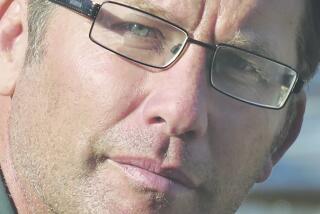‘Cosmos’ recap: ‘The Immortals’ and the origins of life
- Share via
Everyone has had to grapple, eventually, with the stark realization that he or she will one day die. It’s what makes our short human lives so precious -- and what drives so many to seek out ways to cheat death and live on. That’s what lies at the heart of this week’s episode of “Cosmos,” appropriately called “The Immortals.”
Five thousand years ago, in ancient Sumeria (what is now Iraq), an Akkadian princess and high priestess named Enheduana composed what many historians believe are the first signed poems, preserved on inscribed clay tablets, ensuring that she is one of the few women in early history whose name is known to us. Enheduana achieved a kind of immortality; her words extended well beyond her death. I suppose that’s comfort of a sort.
Speaking of ancient epic myths, perhaps you’ve read the tale of Gilgamesh, another early written work, in which the titular king of Uruk is devastated when his BFF, Enkidu, is put to death. Gilgamesh embarks on a quest to uncover the secret of immortality -- the very first voyage of the hero that forms the mythic root of today’s superheroes. Along the way, Gilgamesh encounters the story of a great flood and the building of an ark to ensure life survives the deluge.
So, why, exactly, are we going on about Noah’s flood and ancient Mesopotamian literature on “Cosmos?” Host Neil deGrasse Tyson assures us that life also passes on its stories through subsequent generations. Our stories are written in our DNA, passed on through generations over billions of years, thereby achieving another kind of immortality.
As Tyson intones, “Life propagates by retelling its story.” Cut to an image of a dandelion dispersing its spores, “each seedling is a little paratrooper floating on the wind,” looking for fecund soil in which to take root, thereby ensuring the survival of its species -- much like an ark.
We don’t actually know the origin of life; scientific hypotheses vary. Life -- in the form of bacteria or similar microbial forms -- may have begun in a shallow pool of water, warmed by the sun. Perhaps it arose in the hydrothermal volcanic vents along the ocean floor. Or maybe, just maybe, it came from outer space, hitching a ride on a meteorite.
That last alternative is technically known as “panspermia” -- the notion that much like the dandelion spores, life spreads itself across the universe, not just across the Earth. That brings us to the village of Nakhla, Egypt, where a meteorite crashed in June 1911. (Legend has it that the meteorite vaporized a dog when it hit, but it’s probably not true. Probably.)
The Nakhla fragments turned out to be more than curious collectors’ items. Scientific analysis about 70 years later revealed that the chemical composition was strikingly similar to the atmosphere of Mars, per data collected by NASA’s Viking spacecraft in the 1970s. It’s possible that when an asteroid hit the Red Planet and blasted out a huge crater, a bunch of debris was flung into space, eventually finding its way to Earth. It’s also possible that buried within those rocks were the seeds of microbial life, which lay dormant for the journey through space before reviving under the amicable conditions on Earth.
So, if space debris can shuttle hardy microbes between planets, and possibly even solar systems, that means life should be abundant throughout the universe. Where are these other life forms? We’ve certainly tried to contact them, sending radio messages -- including our radio and TV broadcasts -- out into space. Maybe the aliens’ lack a sense of humor decided to give our planet a pass based on our fondness for “I Love Lucy” and “The Honeymooners.”
Chances are, it’s a matter of timing. The universe is incredibly vast, and even powerful civilizations such as ancient Sumeria -- beset by a great drought that lasted 200 years -- and the Roman Empire eventually crumble and fall. It would take time for our “messages” to propagate, and the odds are slim of them reaching, at just the right time, an alien civilization sufficiently advanced to detect them -- assuming the aliens are even scanning the radio spectrum, as opposed to, say, looking for messages encoded in neutrinos. (I kid you not, this is totally a thing.)
And now “Cosmos” veers waaaay off course with a preachy segment on climate change and how we could be destroying ourselves by not seeking sustainability. According to Tyson, our intelligence is the tool for our survival, assuming we have the will to apply it. Yes, that is true. And I’m sympathetic to the message, but honestly, it really doesn’t fit well here.
After several wonderful narrative- and character-driven episodes, it’s a bit of a letdown to have the series lapse back into the tenuous connections and aimless wandering of earlier episodes. “The Immortals” talks a lot about the power of story; too bad it doesn’t heed its own counsel in this case.
More to Read
The biggest entertainment stories
Get our big stories about Hollywood, film, television, music, arts, culture and more right in your inbox as soon as they publish.
You may occasionally receive promotional content from the Los Angeles Times.










